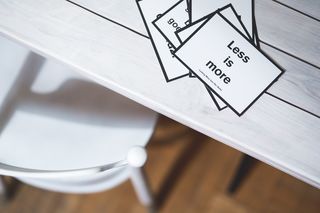
Career
Why You Should Do Less, and How You Can
Why a resolution to do less can help you do better.
Posted January 10, 2020 Reviewed by Gary Drevitch

Wisdom gathered from dozens of interviews with prominent psychologists through work on my podcast, Psychologists Off the Clock, has lead me to a central idea: We take the idea of neglect too seriously. That’s true even about our children, our jobs, and other demanding life roles. That's why my resolution for the coming year is to neglect more of my responsibilities, more often, and more strategically (and not just because I've dropped the ball or come to the end of my rope yet again).
There are, of course, times we should do more in our most important life roles. But in our worry-driven modern age, it’s far more often the case that we should do a whole lot less. Thousands of years ago, Taoists came up with a concept called Wu Wei, which described the power of non-action or simply letting things go. "Sure," you say, "if I stop doing, I can have lots of fun, but then things won’t get done. I'm not sure my kids, spouse, or boss, would delight in that." But it turns out that a little non-action can go a long way.
Our modern parenting ethos glorifies the parent who is always-present, always-enriching, and always-watching. Yet engaging in benign neglect of children can be great for kids and parents alike. Yes, too much neglect is an obvious problem: We don’t want to leave our children in unsafe or unconsidered positions. But intensive parenting practices hinder children’s resilience, independence, academic performance, and mental health.
Take a study that evaluated the mental health of college students who described having overly controlling parents. Researchers Holly Schiffrin and Miriam Liss found that compared to students without overly controlling parents, such students reported higher levels of depression and lower life satisfaction. In our podcast interview, Holly and Miriam laughed as they told me that they, too, have learned the value of neglecting their children in small but important ways. In another interview, Kim Brooks, author of Small Animals: Parenthood in the Age of Fear, talked with me about the growing body of research showing that doing less as parents offers our children greater independence, confidence, and opportunities to develop their own competencies.
Neglecting our work can be similarly advantageous. Work burnout is characterized by emotional exhaustion, detachment, and diminished efficiency. Despite pressure to get more done, doing less helps our work by preventing, mitigating, and helping us to recover from burnout.
As author Alex Pang describes in his wonderful book, Rest: Why You Get More Done When You Work Less, doing less at work can give us a boost in our productivity over time and our creative edge. Delegating tasks to others and choosing more carefully the kinds of assignments we take on versus those that we say "no" to can help us do better in the responsibilities we retain. As Pang told me in our interview, learning to say no, let go, and do less helps us become happier as well as more successful because we have devoted our finite resources to the activities we deem most essential.
How to Do Less, Wisely
In a culture that hallows getting things done and belittles activities that don’t result in ticking something off of a to-do list, you may struggle to figure out what to neglect and how. Start by identifying what matters most to you. Ask yourself what you consider most essential in a regular week of parenting and in a regular week of work. Consider what rises to the top for you in the balance of important things. Now ask the opposite: In a given week, what matters least? What can you let go of because, at the end of the day/week/a lifetime, such activities feel inconsequential?
Greg McKeown's book, Essentialism, offers a clear, three-step process to doing less. (Listen to our interview to hear him walking me through this process.)
- Explore what activities feel essential vs. non-essential.
- Eliminate activities that are non-essential.
- Make space and create sustainable habits around activities you deem to be essential.
What might doing less look like for you? What you can stop doing as a parent so that you can foster your children’s independence, resilience, and creative problem-solving strategies? What can you let go of as a worker so that you can spend more time in the activities that are truly essential? In what other life roles can you strategically do less?
Make 2020 the year you do less, so that you can do better and maybe even be happier.
Facebook/LinkedIn image: Rido/Shutterstock

